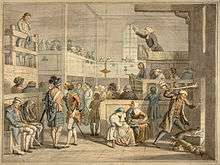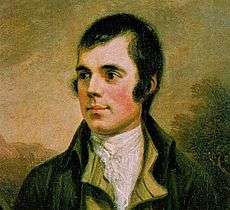Holy Willie's Prayer
| Wikisource has original text related to this article: |
Holy Willie's Prayer is a poem by Robert Burns. It was written in 1785 and first printed anonymously in an eight-page pamphlet in 1789.[1]
It is considered the greatest of all Burns' satirical poems, one of the finest satires by any poet, and a withering attack on religious hypocrisy.
It is written in the Scots language, but is accessible to most modern English readers.
Analysis

The poem is an attack on the bigotry and hypocrisy of some members of the Kirk (Church), as told by the (fictional) self-justifying prayer of a (real) kirk elder, Holy Willie. Throughout the poem, Holy Willie displays his hypocrisy by justifying his own transgressions while simultaneously asking God to judge harshly and show no mercy to his fellow transgressors. Burns used the example of Holy Willie to make the point that the Calvinist theology underpinning the entire Kirk was equally hypocritical.
The Kirk was still a powerful moral force in Burns' day, and one which he believed he had a justified grievance against. Burns felt that belief in predestination, whether to salvation or damnation, could make people morally reckless, because their salvation was believed to rest, not on their own moral actions but on the "election" to salvation by an inscrutable God. He observed that belief in predestination, particularly to salvation, could have the additional tendency to make people insufferably self-righteous. It is this last tendency in particular, and the more general theological and moral sterility embodied in much of the teachings of the contemporary Kirk, that he rails against very effectively in this work.
Willie's soapy sanctimony is alternated with his self-justifying tales of his own fornication and other transgressions with very great skill. The characters are drawn from real life, with no names being changed.
The story of the real Holy Willie
Willie Fisher (Holy Willie) was an elder of Daddy Auld's kirk in Mauchline who conceived a dislike for Gavin Hamilton, a landlord and almoner (treasurer) in the kirk. Hamilton was suspected of financial impropriety when inconsistencies in the accounts were discovered. It may be (this was Hamilton's defence) that the deficit was the result of Hamilton's kindly acts in forgiving the debts of those who were unable to pay their tax to the kirk.
Fisher spied on Hamilton and added the charges of:
- Travelling on the Sabbath.
- Not reading the Bible on a Sunday.
- Digging his garden on the Sabbath (hence the reference to 'kail and potatoes' in the poem)
Fisher's complaint against Hamilton was heard and adjudicated by the Presbytery of Ayr, as is stated in Burn's own commentary on the poem. (In the Presbyterian polity of the Church of Scotland, a presbytery is a regional council of ministers and elders. It may function as a court when complaints against members, or more likely, ministers are brought to it.) Hamilton won the case. Hence, Holy Willie complains bitterly to God not only against Hamilton himself but also against the Presbytery: "Lord, hear my earnest cry and pray'r, Against that Presbyt'ry o' Ayr!"
Willie Fisher never recovered from the ignominy of this public defeat, and, legend has it, was found dead in a ditch with a bottle of whisky.
Burns' commentary appears in an early manuscript of the poem and is often printed with the poem in modern editions:
'Holy Willie was a rather oldish bachelor elder, in the parish of Mauchline, and much and justly famed for that polemical chattering which ends in tippling orthodoxy, and for that spiritualized bawdry which refines to liquorish devotion. In a sessional process with a gentleman in Mauchline, a Mr. Gavin Hamilton, Holy Willie and his priest, Father Auld, after a full hearing in the Presbytery of Ayr, came off but second best, owing partly to the oratorical powers of Mr. Robert Aiken, Mr. Hamilton's counsel, but chiefly to Mr. Hamilton's being one of the most irreproachable and truly respectable characters in the country. On losing his process, the muse overheard him at his devotions.'

Glossary
- pet = huff
- ane = one
- a' = all
- sic = such
- sax = six
- fashed = irked
- yestreen = yesterday evening
- maun = must
- fou = drunk
- kail = kale
- splore = uproar
- gear = possessions
- cartes = cards
References
- In The Book of Ebenezer Le Page, 'Holy Willie' is used as a term of abuse for insincere clerics.
- ↑ Daiches, David (1952). Robert Burns. London: G. Bells
